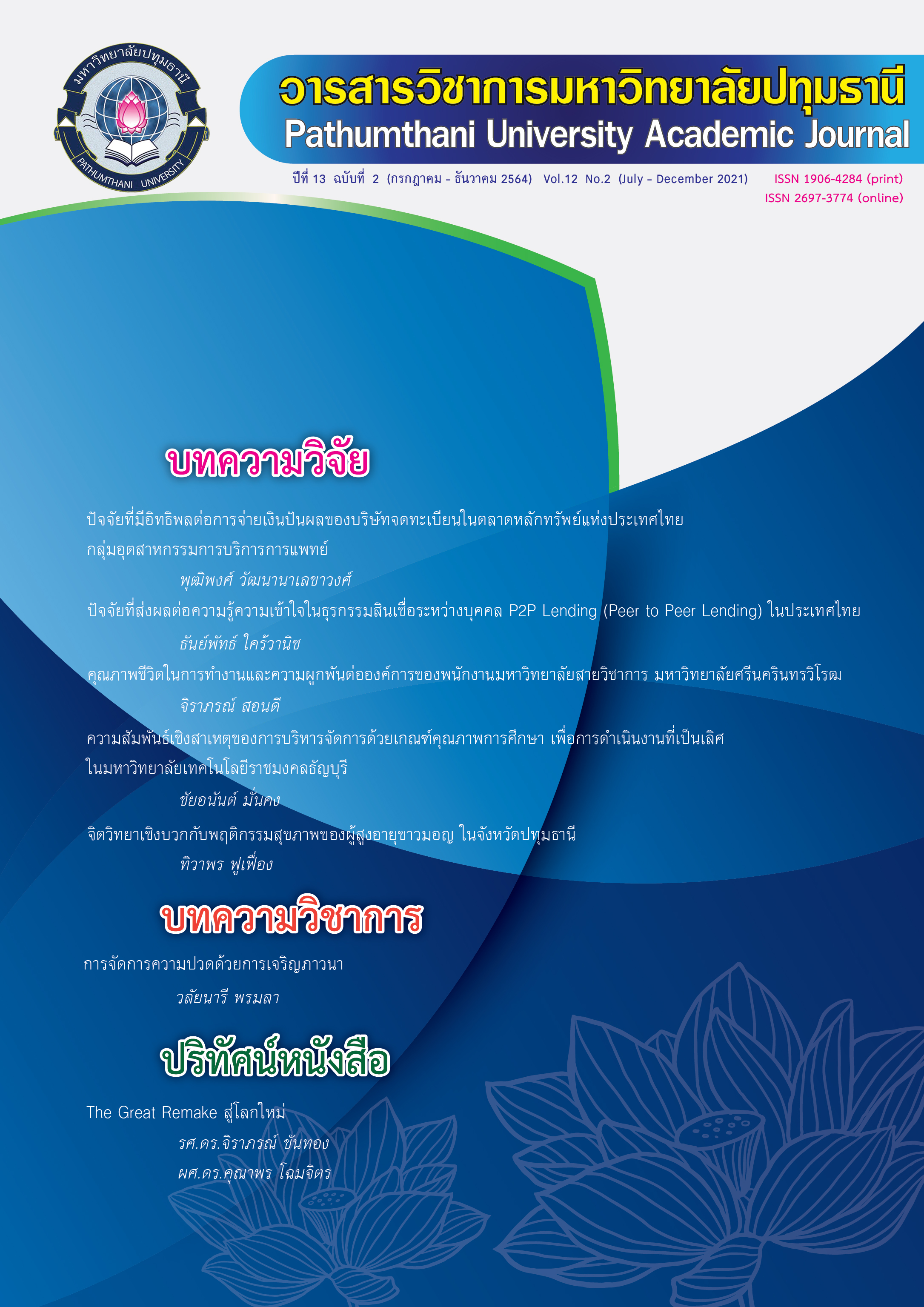การพัฒนาสื่อการเรียนรู้เลิร์นนิงออบเจกต์ตามหลักการศึกษาบันเทิง เพื่อส่งเสริมการแก้ไขปัญหาทางคณิตศาสตร์ของนักศึกษาระดับปริญญาตรี
คำสำคัญ:
สื่อการเรียนรู้เลิร์นนิงออบเจกต์, หลักการศึกษาบันเทิง, ส่งเสริมแก้ไขปัญหาทาง คณิตศาสตร์บทคัดย่อ
งานวิจัยนี้มีวัตถุประสงค์ 1) เพื่อสร้างและหาประสิทธิภาพของสื่อการเรียนรู้เลิร์นนิงออบเจกต์ตามหลักการศึกษาบันเทิง 2) เพื่อเปรียบเทียบการแก้ไขปัญหาทางคณิตศาสตร์ก่อนและหลังใช้สื่อการเรียนรู้เลิร์นนิงออบเจกต์ตามหลักการศึกษาบันเทิง 3) เพื่อประเมินความพึงพอใจของนักศึกษาที่มีต่อสื่อการเรียนรู้เลิร์นนิงออบเจกต์ตามหลักการศึกษาบันเทิง เพื่อส่งเสริมการแก้ไขปัญหาทางคณิตศาสตร์ของนักศึกษาระดับปริญญาตรี กลุ่มตัวอย่าง ได้แก่ นักศึกษาระดับปริญญาตรี ที่ลงทะเบียนรายวิชาคณิตศาสตร์สำหรับคอมพิวเตอร์กราฟิก มหาวิทยาลัยราชภัฏบ้านสมเด็จเจ้าพระยา ภาคเรียนที่ 1 ปีการศึกษา 2562 ได้มาโดยเลือกกลุ่มตัวอย่างด้วยวิธีการเจาะจง จำนวน 32 คน เครื่องมือที่ใช้ในการวิจัย ประกอบด้วย แบบสัมภาษณ์ความคิดเห็นของผู้เชี่ยวชาญแบบมีโครงสร้าง แบบประเมินประสิทธิภาพของเลิร์นนิงออบเจกต์ตามหลักการศึกษาบันเทิง แบบประเมินความสามารถในการแก้ไขปัญหาทางคณิตศาสตร์ของนักศึกษา แบบประเมินความพึงพอใจของนักศึกษา สถิติที่ใช้ ค่าเฉลี่ย ส่วนเบี่ยงเบนมาตรฐาน ค่า t-test
ผลการวิจัย พบว่า ได้สื่อเลิร์นนิงออบเจกต์ 5 บทเรียน มีค่าประสิทธิภาพ 81.11/81.67 เป็นไปตามเกณฑ์ 80/80 ผลการเปรียบเทียบการแก้ไขปัญหาคณิตศาสตร์ก่อนและหลังเรียนแตกต่างกันอย่างมีนัยสำคัญทางสถิติที่ระดับ .05 ผลความพึงพอใจของนักศึกษาอยู่ในระดับมาก
เอกสารอ้างอิง
ชมพูนาฎ ชมพูพันธ์. (2561). “การใช้เลิร์นนิ่งออบเจ็กต์เพื่อการเรียนการสอนผ่านระบบเครือข่ายเพื่อพัฒนาทักษะการสร้างสื่อมัลติมีเดีย สำหรับนักศึกษาปริญญาตรี มหาวิทยาลัยราชภัฎเลย”. วารสารวิชาการศึกษาศาสตร์ มหาวิทยาลัยศรีนครินทรวิโรฒ. ปีที่ 19 ฉบับที่ 1. (มกราคม-มิถุนายน 2561). หน้า 31-42.
ณัฐกฤดา ห้วยทราย นงลักษณ์ วิริยะพงษ์ และ มนชยา เจียงประดิษฐ์. (2564). “การพัฒนากิจกรรมการเรียนรู้ตามกระบวนการแก้ปัญหาของโพลยาที่ส่งเสริมความสามารถในการแก้โจทย์ปัญหาทางคณิตศาสตร์ เรื่อง สมการเชิงเส้นตัวแปรเดียวของนักเรียนชั้นมัธยมศึกษาปีที่ 1”. วารสารศึกษาศาสตร์ มหาวิทยาลัยบูรพา. ปีที่ 32 ฉบับที่ 2. หน้า 120-132.
ณัฐวดี สิทธิรัตน์ และจลกล แก่นเพิ่ม. (2560). “การพัฒนาเลิร์นนิ่งออบเจ็กต์บนแท็บเล็ตเรื่องคำศัพท์ภาษาอังกฤษสำหรับนักเรียนชั้นประถมศึกษาปีที่ 2 โรงเรียนชุมชนบ้านคลองเคียน”. วารสารศรีปทุม ชลบุรี. ปีที่ 14 ฉบับที่ 1. หน้า 124-132.
นุชรัตน์ นุชประยูร และไพฑูรย์ จันทร์เรือง. (2563). “การพัฒนาสื่อการเรียนรู้เลิร์นนิงออบเจกต์ตามหลัการศึกษาบันเทิง เรื่องบริหารพื้นฐานบนอินเทอร์เน็ต สำหรับหน่วยเรียนรู้ย่อยรายวิชาการสื่อสารข้อมูลและเครือข่าย”. ใน การประชุมระดับชาติ ครั้งที่ 12 มหาวิทยาลัยราชภัฏนครปฐม. นครปฐม: มหาวิทยาลัยราชภัฏนครปฐม. หน้า 837-844).
สุวิทย์ ไวยกุล จินตวีร์ คล้ายสังข์ และประกอบ กรณีกิจ. (2559). การพัฒนารูปแบบการออกแบบเลิร์นนิงออบเจ็คบนเท็บเล็ตโดยใช้เกมเป็นฐานที่มีการช่วยเสริมศักยภาพเพื่อส่งเสริมมโนทัศน์ทางคณิตศาสตร์. สาขาวิชาเทคโนโลยีและสื่อสารการศึกษา จุฬาลงกรณ์มหาวิทยาลัย.
วรัตต์ อินทสระ. (2562). เปลี่ยนห้องเรียนเป็นห้องเล่น (Game based Learning). กรุงเทพมหานคร : มหาวิทยาลัยราชภัฏสวนดุสิต
วัชราภรณ์ ถ้ำกลาง และสุมาลี ชัยเจริญ. (2560). “การแก้ปัญหาทางคณิตศาสตร์ของนักเรียนที่เรียนด้วยโมเดลสิ่งแวดล้อมการเรียนรู้บนเครือข่ายตามแนวคอนสตรัคติวิสต์ที่ส่งเสริมการแก้ปัญหาทางคณิตศาสตร์ของนักเรียนระดับชั้นประถมศึกษาปีที่ 6 โรงเรียนสาธิตมหาวิทยาลัยขอนแก่น (มอดินแดง)”. วารสารมหาวิทยาลัยนครพนม. ปีที่ 7 ฉบับที่ 2. หน้า 64–71.
Brad Paras and Jim Bizzoncchi. (2005). GAME, MOTIVATION, AND EFFECTIVE LEARNING: an intergrate model for educational game design. University of Vancouver, Canada.
Galvao, Matins and Goms. (2000). “Modeling reality with simulation games for a cooperative learning”. In Proceedings of the 2000 Winter Simulation Conference. USA: Orlando, FL.
Harnani Mat Zin and Nor Zuhaidah Mohd Zain. (2010). “The Effects of edutainment towards students’ achievements”. Proceeding of Regional Conference on Knowledge Integration in ICT 2010
Prensky, M. (2001). Digital Game-Based Learning. New York: McGraw-Hill.
Meagan, R. K. (2008). “The Instructional Design of an Educational Game: Form and Function in JUMP”. Research into practice research compendium. Honolulu, HI: Pacific Resources for Education and Learning. 61-69.
Yilmaz Kara and Selami Yesilyurt. (2007). “Comparing the impacts of tutorial and edutainment software programs on students’ achievements, Misconceptions, and attitudes towards Biology”. Journal of Science Education and Technology. pp 32-41.
ดาวน์โหลด
เผยแพร่แล้ว
รูปแบบการอ้างอิง
ฉบับ
ประเภทบทความ
สัญญาอนุญาต
บทความที่ได้รับการตีพิมพ์เป็นลิขสิทธิ์ของวารสารมหาวิทยาลัยปทุมธานี
ข้อความที่ปรากฎในบทความแต่ละเรื่อง เป็นความคิดเห็นส่วนตัวของผู้เขียน กองบรรณาธิการไม่จำเป็นต้องเห็นด้วยเสมอไป และไม่มีส่วนรับผิดชอบใด ๆ ถือเป็นความรับผิดชอบของผู้เขียนแต่เพียงผู้เดียว



